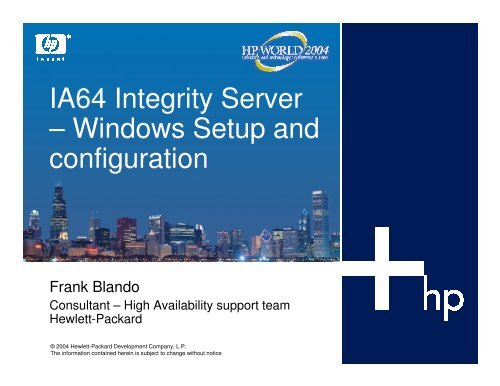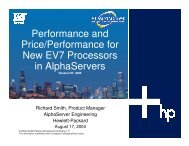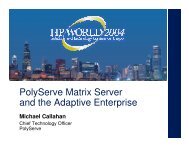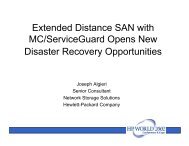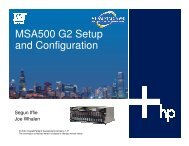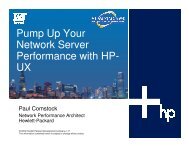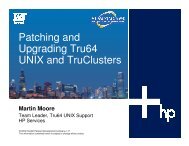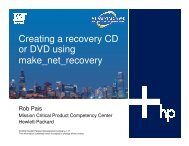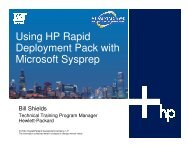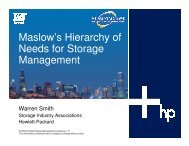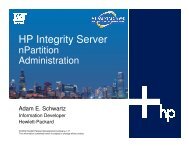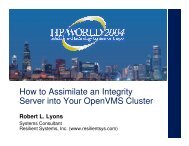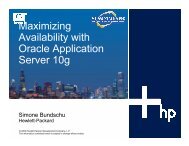IA64-based Integrity Server: Setup and Configuration - OpenMPE
IA64-based Integrity Server: Setup and Configuration - OpenMPE
IA64-based Integrity Server: Setup and Configuration - OpenMPE
You also want an ePaper? Increase the reach of your titles
YUMPU automatically turns print PDFs into web optimized ePapers that Google loves.
<strong>IA64</strong> <strong>Integrity</strong> <strong>Server</strong><br />
– Windows <strong>Setup</strong> <strong>and</strong><br />
configuration<br />
Frank Bl<strong>and</strong>o<br />
Consultant – High Availability support team<br />
Hewlett-Packard<br />
© 2004 Hewlett-Packard Development Company, L.P.<br />
The information contained herein is subject to change without notice
Headless<br />
Windows
Headless – Why?<br />
• Console monitor left over from single user PC<br />
− Tempting for people to use / misuse<br />
• True high-end servers do not need it!<br />
− Normal management (In-b<strong>and</strong>) done over terminal<br />
session<br />
− Emergency management (out-of-b<strong>and</strong>) done from<br />
telnet or serial connected terminal<br />
• Not related to RILO<br />
− No additional hardware<br />
− Does not redirect Keyboard / Video / Mouse<br />
3
Headless – When?<br />
• Appears with Windows <strong>Server</strong> 2003<br />
− OS support in all Windows <strong>Server</strong> 2003 SKUs<br />
− Called EMS (Emergency Management Services)<br />
• Needs hardware & firmware cooperation<br />
− Require firmware upgrade for mid-life ProLiant<br />
− Not supported on very old ProLiant<br />
− Chosen path for HP <strong>Integrity</strong> <strong>Server</strong><br />
4
Headless – How?<br />
• Software:<br />
− Initial boot loader has been modified<br />
− OS kernel has been modified<br />
− Addition of a pseudo-driver to give comm<strong>and</strong> line<br />
access (called sacdrv)<br />
• Hardware:<br />
− Requires serial line with terminal / terminal emulator or<br />
NIC <strong>and</strong> telnet client<br />
• Firmware:<br />
− Should support normal pre-boot (POST <strong>and</strong><br />
configuration) redirection to serial<br />
5
Headless – Who?<br />
• You still can install a VGA console <strong>and</strong> operate<br />
your server like an old fashion PC<br />
• Most people already manage their servers from<br />
their workstation<br />
− Install the Administrative Tools from 32-bit server using<br />
\\W2K3server\Admin$\System32\AdminPak.MSI<br />
− Microsoft allows 2 connections for management without<br />
Terminal Services licenses<br />
− Multiple people can share 1 session for learning /<br />
troubleshooting purpose (Terminal <strong>Server</strong> Manager <br />
Select server in left pane Select session in right<br />
pane Right-click Remote Control)<br />
6
Headless – Where?<br />
• <strong>Integrity</strong> <strong>Server</strong>s offer additional features:<br />
− Always-on management processor<br />
− Headless serial port available on the management LAN<br />
via Telnet or via a web interface which includes a<br />
compatible terminal emulation in Java<br />
− Headless console activity log<br />
7
Headless – WMIC<br />
• New comm<strong>and</strong> line utility for Windows <strong>Server</strong><br />
2003<br />
• Provides access to almost all management<br />
functions for Windows<br />
• Consistent syntax not matter what you manage<br />
8
Headless – Gotcha<br />
• Depending on the terminal emulator / telnet<br />
program you use, function keys can be tricky<br />
− Use to replace with less<br />
than 2 seconds between keystrokes<br />
− Use other means to achieve your goal: /SAFEBOOT<br />
boot option to replace at boot time<br />
• If terminal services is not enable, use comm<strong>and</strong>:<br />
WMIC RDToggle WHERE AllowTsConnections=0 CALL SetAllowTsConnections 1<br />
9
Headless – ProLiant<br />
10
Headless – Superdome<br />
11
Headless – rx2600<br />
12
Windows <strong>Setup</strong>
What should you install?<br />
• Microsoft media or HP Media?<br />
− Pick <strong>based</strong> on license, requirements, <strong>and</strong> functionality<br />
• Which SKU?<br />
− St<strong>and</strong>ard Edition only available starting with SP1<br />
− Enterprise Edition supports up to 8 CPUs <strong>and</strong> 64 GB of<br />
memory<br />
− Datacenter Edition required when server exceeds<br />
Enterprise Edition supported limits, only available from<br />
HP<br />
− Plan ahead: what if you need to upgrade from 8 CPUs<br />
to 16 CPUs? You currently cannot upgrade Enterprise<br />
Edition to Datacenter Edition, must re-install!<br />
14
<strong>Setup</strong> methods<br />
• Microsoft media<br />
− For customer with Microsoft volume licenses<br />
− Not available for Datacenter Edition<br />
− Same setup process as 32-bit systems<br />
− HP specific tools <strong>and</strong> patches installed separately<br />
• HP Media<br />
− WinPE Based quick restore<br />
− HP tools pre-installed<br />
− Some hot-fixes are pre-installed<br />
− Less configuration options but faster (SYSPREPed<br />
image)<br />
15
Microsoft <strong>Setup</strong><br />
• Few differences between 32-bit <strong>and</strong> 64-bit<br />
− Require GPT disk<br />
− No WPA (Still requires key)<br />
• <strong>IA64</strong> <strong>Integrity</strong> servers do not have floppies<br />
− No option cannot change HAL<br />
− No option cannot load 3 rd part storage drivers<br />
• No BOOT.INI<br />
• Same headless install as 32-bit servers, but likely<br />
new to everyone<br />
16
Microsoft <strong>Setup</strong><br />
• Requires HP specific patches:<br />
− 821047 for NUMA <strong>Integrity</strong> servers (rx7620, rx8620,<br />
<strong>and</strong> Superdome)<br />
− 833272 for mx2 <strong>Integrity</strong> <strong>Server</strong>s (2 <strong>IA64</strong> per <strong>IA64</strong> slot)<br />
• Apply HP tools <strong>and</strong> instrumented drivers<br />
− Download from WEB @ http://www.hp.com Support<br />
& Drivers type server model<br />
17
Microsoft <strong>Setup</strong> – EBSU<br />
• Obtain the Smart <strong>Setup</strong> media from HP<br />
• Boot Smart <strong>Setup</strong> media<br />
• Perform a Smart <strong>Setup</strong><br />
− Allows using HP Specific boot driver without using<br />
but using a virtual floppy.<br />
18
Microsoft <strong>Setup</strong> – No EBSU<br />
• Insert the distribution media<br />
• Get to the EFI boot menu<br />
• Boot from CD<br />
or<br />
• Select “EFI Shell [Built-in]” option<br />
• Use the device map to identify the device for the<br />
CDROM<br />
• Start the install from that media<br />
19
Microsoft <strong>Setup</strong><br />
20
Microsoft <strong>Setup</strong> – GUI<br />
• Identical to 32-bit!<br />
21
Microsoft <strong>Setup</strong> – Headless<br />
!<br />
22
Microsoft <strong>Setup</strong> – Headless<br />
23
Microsoft <strong>Setup</strong> – Headless<br />
24
Microsoft <strong>Setup</strong> – Headless<br />
25
Microsoft <strong>Setup</strong> – Headless<br />
26
Microsoft <strong>Setup</strong> – Headless<br />
27
Microsoft <strong>Setup</strong> – Headless<br />
28
Microsoft <strong>Setup</strong> – Headless<br />
in less than 2 seconds!<br />
29
Microsoft <strong>Setup</strong> – Headless<br />
30
Microsoft <strong>Setup</strong> – Headless<br />
31
Microsoft <strong>Setup</strong> – Headless<br />
32
Microsoft <strong>Setup</strong> – Headless<br />
33
Microsoft <strong>Setup</strong> – Headless<br />
34
Microsoft <strong>Setup</strong> – Headless<br />
35
Microsoft <strong>Setup</strong> – Headless<br />
36
Microsoft <strong>Setup</strong> – Headless<br />
37
Microsoft <strong>Setup</strong> – Headless<br />
38
Microsoft <strong>Setup</strong> – Headless<br />
39
Microsoft <strong>Setup</strong> – Headless<br />
40
Microsoft <strong>Setup</strong> – Headless<br />
41
Microsoft <strong>Setup</strong> – Headless<br />
42
Microsoft <strong>Setup</strong> – Headless<br />
Note<br />
order!<br />
43
Microsoft <strong>Setup</strong> – Headless<br />
44
Microsoft <strong>Setup</strong> – HP Software<br />
• After installing Windows:<br />
− Add SNMP using Add / Remove programs<br />
− Use the Smart <strong>Setup</strong> media to install the HP Agents,<br />
drivers, <strong>and</strong> tools<br />
45
Microsoft <strong>Setup</strong> – Troubleshooting<br />
• Same log files:<br />
− %WinDir%\<strong>Setup</strong>Log.txt<br />
− %WinDir%\<strong>Setup</strong>API.log<br />
− %WinDir%\<strong>Setup</strong>ERR.log<br />
− %WinDir%\<strong>Setup</strong>Act.log<br />
− %WinDir%\WinNT32.log when started from WinNT32<br />
• When running into problems, use <strong>IA64</strong> specific<br />
MPSRPT_SETUPPerf<br />
46
HP Quick Restore<br />
• Quick Restore is <strong>based</strong> on a SYSPREP image<br />
done at HP<br />
− Allows integrated HP specific customizations<br />
• Installation is 3 steps:<br />
− Boot WinPE from restore media<br />
− Restore the SYSPREP image<br />
− Reboot <strong>and</strong> execute post-SYSPREP mini-setup<br />
• WinPE is Windows booted from R/O media<br />
− See more when discussing disaster recovery<br />
47
HP Quick Restore<br />
• Currently always format drive <strong>and</strong> restore on 1 st<br />
disk found in directory C:\Windows<br />
− \\.\Adapert0\Drive0\Windows<br />
− Cannot do parallel install<br />
− Scheduled to change in near future<br />
• Device enumeration order can cause problems:<br />
SAN device can show up before SmartArray<br />
devices<br />
− Unplug FC HBA when in doubt before trashing disks<br />
− Alluded to in DVD:\ReadMe.txt<br />
48
HP Quick Restore – Patches<br />
• Some patches <strong>and</strong> hot-fixes are integrated<br />
− Depends on the Quick Restore version<br />
− Look for file named ATTRIB.TXT on restore media, has list<br />
of all files (Including hot-fixes): Some are pre-installed,<br />
some are provided but not automatically installed<br />
− Check with HP if unsure<br />
− Still need to apply latest security hot-fix after installing<br />
49
HP Quick Restore<br />
50
HP Quick Restore<br />
51
HP Quick Restore<br />
52
HP Quick Restore<br />
• WinPE is <strong>based</strong> on Windows XP<br />
− Hence it will use at most 2 processors<br />
− Do not panic if only 2 CPUs are detected at this time!<br />
53
HP Quick Restore – GUI<br />
54
HP Quick Restore – GUI<br />
55
HP Quick Restore – GUI<br />
56
HP Quick Restore – GUI<br />
57
HP Quick Restore – GUI<br />
• After reboot, identical to 32-bit post-SYSPREP<br />
mini-setup<br />
58
HP Quick Restore – Headless<br />
59
HP Quick Restore – Headless<br />
60
HP Quick Restore – Headless<br />
61
HP Quick Restore – Headless<br />
62
HP Quick Restore – Headless<br />
63
HP Quick Restore – Headless<br />
64
HP Quick Restore – Headless<br />
65
HP Quick Restore – Headless<br />
66
HP Quick Restore – Headless<br />
67
HP Quick Restore – Headless<br />
68
HP Quick Restore – Headless<br />
69
HP Quick Restore – Headless<br />
70
HP Quick Restore – Headless<br />
71
HP Quick Restore – Headless<br />
72
HP Quick Restore – 1 st login<br />
73
HP Quick Restore – 1 st login<br />
74
HP Quick Restore – 1 st login<br />
75
HP Quick Restore – Troubleshooting<br />
• Problems during restore do not leave any log files<br />
− Make sure to record messages<br />
• Problems during post-SYSPREP setup uses<br />
st<strong>and</strong>ard log files:<br />
− Same log files in %WinDir% as during a normal<br />
SysPrep first boot<br />
• Installed hot-fix list in %WinDir% as<br />
KB######.log or using WMIC:<br />
WMIC QFE GET HotFixID,Description<br />
76
Management
Management – Built-in Tools<br />
• Built-in Windows Management tools are identical<br />
− MMC is only application that allows mixing 32-bit <strong>and</strong><br />
64-bit environments<br />
− Most tools are present in 64-bit version <strong>and</strong> 32-bit<br />
version (Via the WoW64)<br />
− 32-bit version of some tools might show confusing<br />
information due to reflection <strong>and</strong> redirection<br />
− Because some tools allow only 1 copy to run, starting a<br />
64-bit tool is not enough to guarantee you are running<br />
the 64-bit version (RegEdit, NTBackup, …)<br />
78
Management – Built-in Tools<br />
• Be aware of the version you are using, Help<br />
About shows when you are running 64-bit tool<br />
79
Management – Microsoft Tools<br />
• Management application not available native<br />
− Plan for a native 64-bit MOM server<br />
− 32-bit MOM 2005 will manage 64-bit systems with<br />
included 64-bit agent<br />
− 32-bit SMS 2003 SP1 will manage 64-bit clients<br />
No Remote Control, use Terminal <strong>Server</strong><br />
• ResKit tools not supported on 64-bit systems<br />
− Lots of tools are therefore “Use at your own risk”<br />
• MBSA currently not available for 64-bit systems<br />
80
Management – 32-bit tools<br />
• Simple 32-bit tools should run on <strong>IA64</strong> machines<br />
as long as:<br />
− No drivers (No 32-bit kernel code allowed)<br />
− No svchost <strong>based</strong> services, only st<strong>and</strong>-alone .exe<br />
− Vendor specifically indicate support on 64-bit systems<br />
• Beware of 32-bit application installation method<br />
− BAT file <strong>and</strong> other un-usual install techniques are likely<br />
to cause grief<br />
− 16-bit setup application are h<strong>and</strong>led specially<br />
• If a 32-bit application has problem, the install<br />
procedure is the 1 st place to look!<br />
81
Management – Remote<br />
Management<br />
• Keep management tools remote when ever<br />
possible<br />
− Keep high-end / high-$ machine for high-end server<br />
tasks<br />
• Vendor should specifically indicate support for<br />
64-bit systems<br />
• Install minimum number of applications on server<br />
for best availability<br />
82
Management – Remote<br />
Management<br />
• Investigate a management network<br />
− Not interfere with production client / server activity<br />
− Also reduce exposure to Telnet password grabbing<br />
83
Management – Different Thinking<br />
• Most tasks can be accomplished the same way;<br />
however, some tasks require different thinking.<br />
For example:<br />
− To force a crash on a hung server, do not use<br />
KB244139 but rather use SAC> CrashDump comm<strong>and</strong>.<br />
Creates the same STOP 0xE2 foot-print!<br />
− GPT disk booting requires boot option with right GUID.<br />
A good disk with valid system files is not bootable<br />
without this. Make backup of boot option after every<br />
change.<br />
84
Management – Login script<br />
• Make sure you modify your login scripts to check<br />
architecture <strong>and</strong> do only what is appropriate on<br />
<strong>IA64</strong> machine<br />
• Be careful when using GPO for software<br />
deployment, take architecture in consideration<br />
85
Management – Disaster Recovery<br />
• The key is planning!<br />
− Test before needed<br />
− Check with backup vendor is they support WinPE<br />
− Make backup of your boot options after EVERY<br />
change, cannot be rebuild once lost! Practice <strong>and</strong> test<br />
moving system disks…<br />
• Be sure to ask “what if” <strong>and</strong> have a solid fall-back<br />
/ back-off plan<br />
86
Management – Disaster Recovery<br />
• Some options unavailable on <strong>IA64</strong>:<br />
− Comm<strong>and</strong> console not available:<br />
WINNT32 /CMDCONS does not work on 64-bit<br />
Windows<br />
− ASR not available:<br />
Hard-coded requirement for floppy<br />
See Hotfix MS KB820364 for USB floppy<br />
See Hotfix MS KB817708 for more hotfixes<br />
87
Management – Disaster Recovery<br />
• HP media specific restrictions:<br />
− HP Media auto-answer does not allow the Repair<br />
option<br />
− Parallel / multi install not possible with current HP<br />
media<br />
Only installs to \\.\Adapert0\Drive0\Windows<br />
• MS Media specific restrictions:<br />
− No access to WinPE<br />
88
Management – Disaster Recovery<br />
• Available alternatives:<br />
− WinPE – Boot the HP restore media. WinPE gives you<br />
similar capabilities to Winternals ERD Comm<strong>and</strong>er!<br />
− Safeboot – Easiest to modify boot entry to include<br />
/SAFEBOOT option rather than <br />
− Snapshot copy of boot disk – Check with the vendor for<br />
limitations<br />
− Good backup – NtBackup can be used from WinPE<br />
(VGA mode only)<br />
− Rebuild<br />
89
Management – Consolidation<br />
• Large <strong>Integrity</strong> servers can be use to consolidate<br />
multiple smaller 32-bit SQL servers<br />
− Make sure the applications have compatible<br />
requirements: Downtime, management domains,<br />
security domain, add-in <strong>and</strong> plug-ins, …<br />
• WSRM is available on 64-bit<br />
− Use to solve technical issues<br />
− Do not use to solve political issues<br />
90
SQL <strong>Server</strong><br />
2000
64-bit SQL <strong>Server</strong> 2000<br />
• Built-in SP3<br />
• Should install hotfix MS03-031 before connecting<br />
to network<br />
• Most information available in MSDN <strong>and</strong> not<br />
TechNet<br />
• Only core functionality ported to 64-bit<br />
• Leverages Windows 2003 64-bit components<br />
− MDAC 2.8 stack<br />
− DTC<br />
− HTML Help<br />
− MMC<br />
92
64-bit SQL <strong>Server</strong> 2000 –<br />
Installation<br />
• Completely different installation procedure<br />
− 32-bit install is InstallShield <strong>based</strong><br />
− 64-bit install is MSI <strong>based</strong><br />
• No remote installation<br />
• Connectivity-Only option is not available<br />
• Code samples are not installed<br />
93
64-bit SQL <strong>Server</strong> 2000 –<br />
Installation<br />
• Network Library configuration not available from<br />
setup<br />
− <strong>Setup</strong> enables Shared Memory, Named Pipes, <strong>and</strong><br />
TCP/IP Use the SQL <strong>Server</strong> Network Utility to<br />
change the settings that enable or disable protocols<br />
− Configure client network libraries using the Client<br />
Network Utility (cliconfg.exe) included with the 64-bit<br />
versions of the Windows <strong>Server</strong> 2003 family<br />
94
64-bit SQL <strong>Server</strong> 2000 –<br />
Installation<br />
• Limited child feature selection<br />
− Tools feature installs all tools; there is no option to<br />
select individual tools<br />
− <strong>Server</strong> Components are limited to SQL <strong>Server</strong> <strong>and</strong> the<br />
Full-Text Search Engine<br />
• Non-cluster instance are removed or changed<br />
with the Add or Remove Programs<br />
95
64-bit SQL <strong>Server</strong> 2000 - Installation<br />
96
64-bit SQL 2000 – Clustering<br />
• No node limit unlike 32-bit version<br />
• Cannot use Add or Remove Programs to add or<br />
remove features in a clustered instance<br />
− You must use the <strong>Setup</strong>.exe graphical interface or the<br />
comm<strong>and</strong> line<br />
97
64-bit SQL 2000 – Analysis Services<br />
• Only for the SQL <strong>Server</strong> OLE database provider<br />
<strong>and</strong> SQL <strong>Server</strong> ODBC driver<br />
− OLE DB provider for ODBC is not supported (not<br />
existent)<br />
− Other DB providers (Oracle) may be available<br />
• SP3-<strong>based</strong> so Remote Analysis Manager (client)<br />
must be SP3 also<br />
98
64-bit SQL 2000 – Data Migration<br />
• Plug in the disks <strong>and</strong> go!<br />
− On-disk structure is 100% the same<br />
− To attach a 32-bit database to a 64-bit instance use<br />
detach/attach or backup/restore in 32-bit Enterprise<br />
Manager<br />
− You can move databases back <strong>and</strong> forth between 32-<br />
bit <strong>and</strong> 64-bit versions of SQL <strong>Server</strong><br />
− Migrating data from SQL <strong>Server</strong> version 7.0 is also<br />
supported using the same methods<br />
99
64-bit SQL 2000 – Documentation<br />
• This release of Books Online table of contents is<br />
organized by platform:<br />
− 64-bit content is grouped together in a node entitled<br />
"SQL <strong>Server</strong> 2000 (64-bit)“<br />
− 32-bit topics are grouped together in a node called<br />
"SQL <strong>Server</strong> 2000"<br />
100
64-bit SQL 2000 – NUMA H<strong>and</strong>ling<br />
• Special NUMA friendly version of SQL exists<br />
− Adds free page list <strong>and</strong> connection affinity features<br />
− Require great care when configuring<br />
• Available from MS as SQL server build<br />
8.00.925.0 or greater<br />
− T825 enables<br />
− There is more to it, make sure to involve SQL<br />
resources<br />
− Test <strong>and</strong> characterize before going in production<br />
• Nowhere close to NUMA awareness of SQL 2005<br />
101
SQL <strong>Server</strong> 2000 – Management<br />
• Only remote management is supported, from a<br />
32-bit system using the 32-bit management tools<br />
102
SQL <strong>Server</strong> 2000 – Other<br />
Differences<br />
• Since only the core functionality was ported to 64-<br />
bits, there is a slew of other differences!<br />
− Make sure you check the release notes <strong>and</strong> Microsoft<br />
MSDN for all the details before starting deployment!<br />
− A test environment can of great use<br />
103
Help
You are not alone!<br />
• Documentation <strong>and</strong> software online at:<br />
http://h20000.www2.hp.com/bizsupport/TechSupport/Product.jsp?loca<br />
le=en_US&prodTypeId=15351&prodSubCatId=71811<br />
• If you get stuck you can call on us<br />
− Warrantee support 800-593-6631 (phone number in<br />
documentation)<br />
− Range of support contract are available<br />
− Per incident support available<br />
105
Co-produced by:


